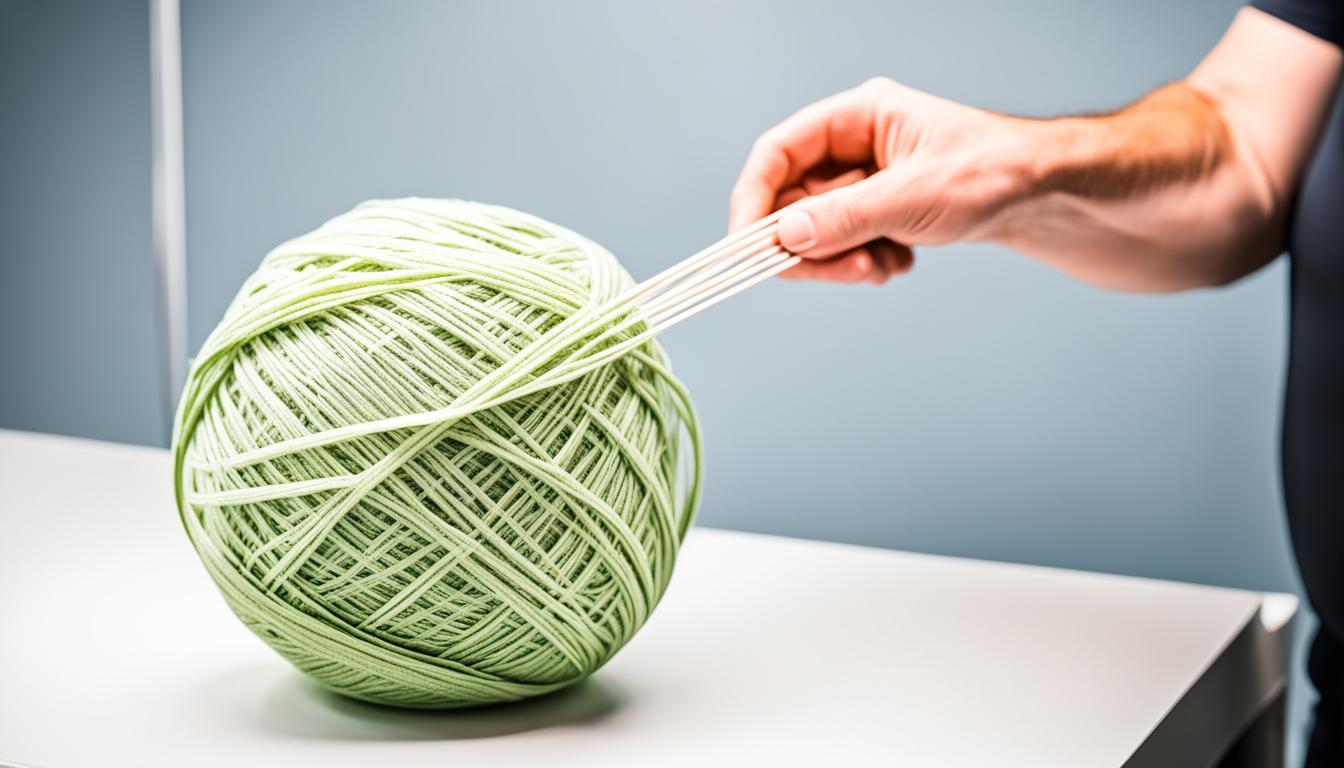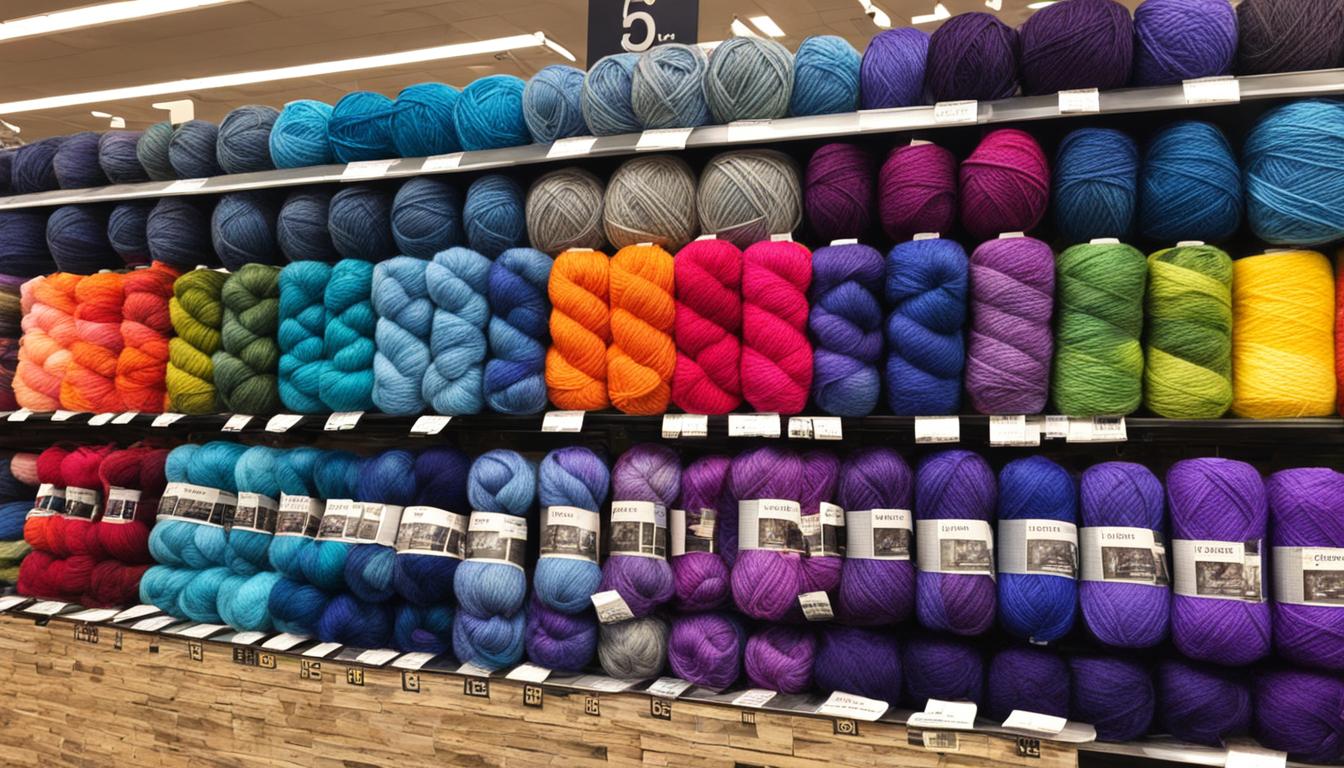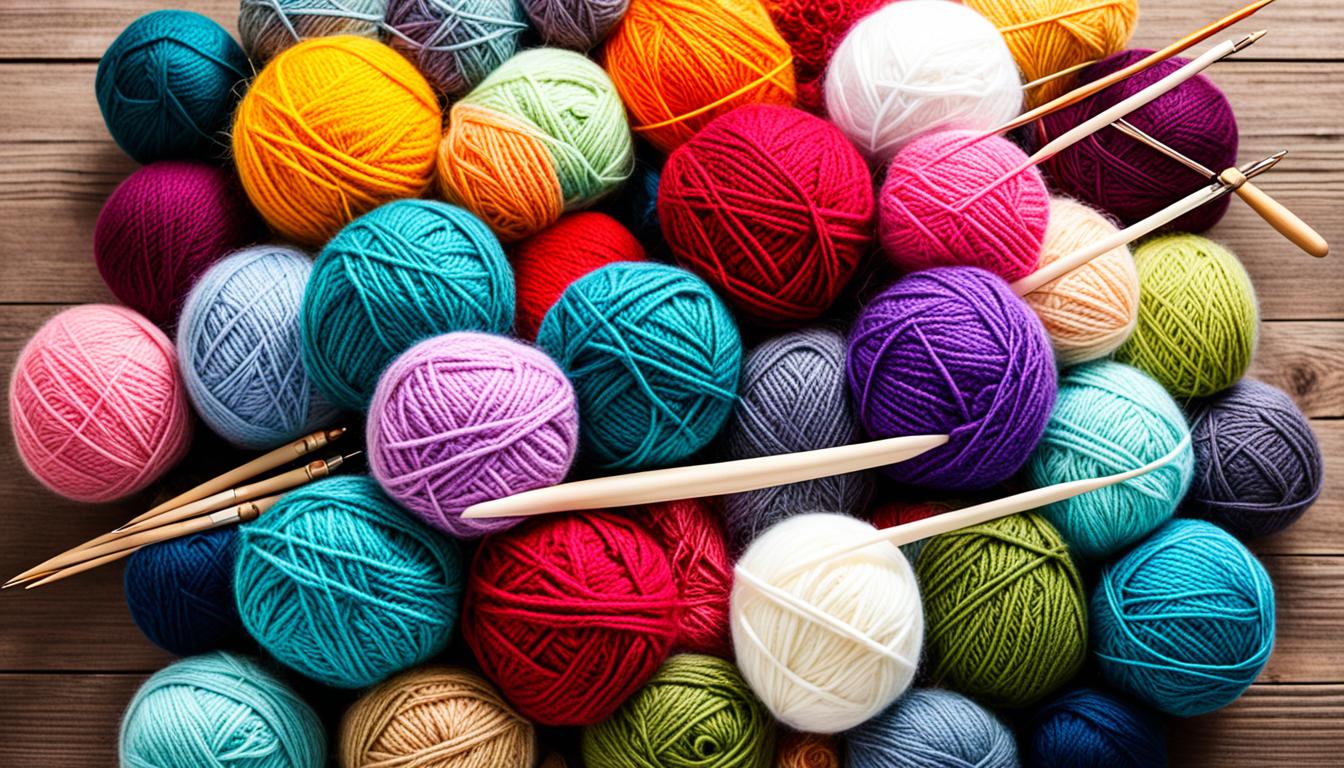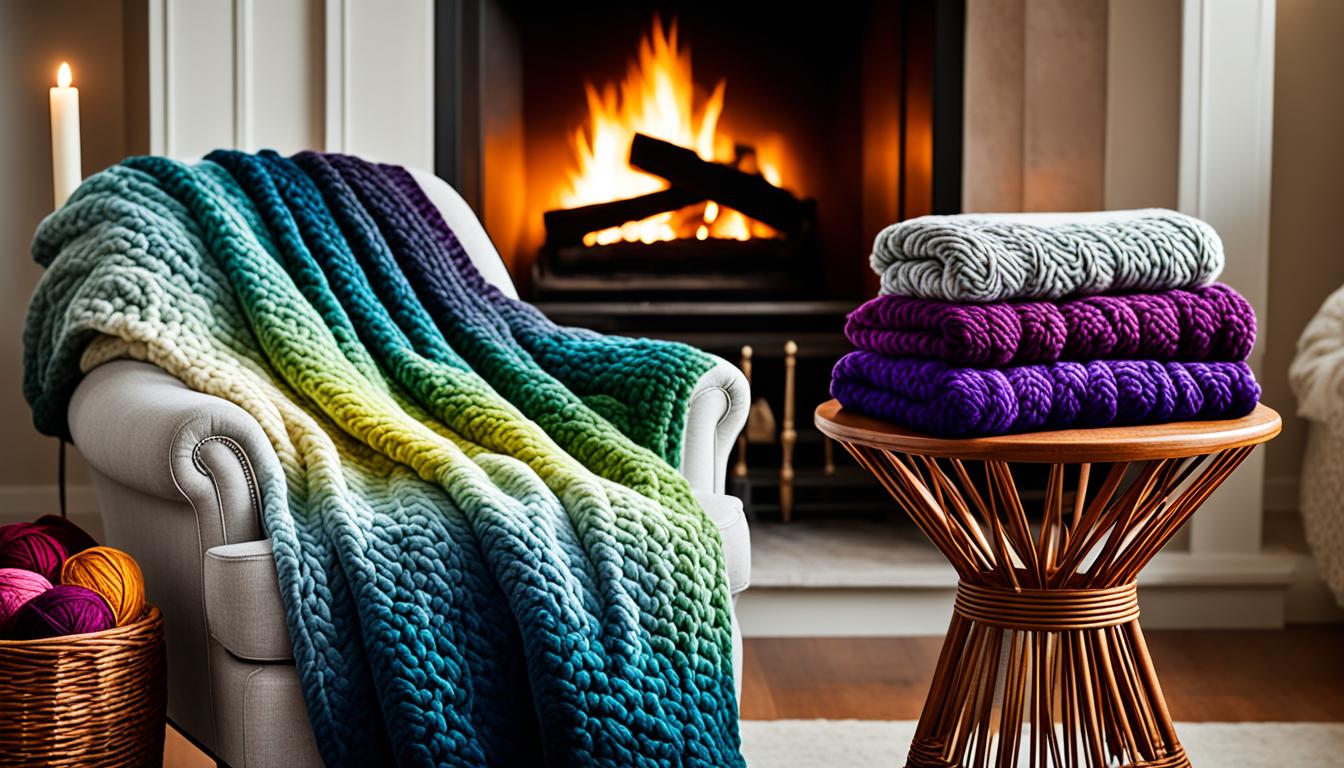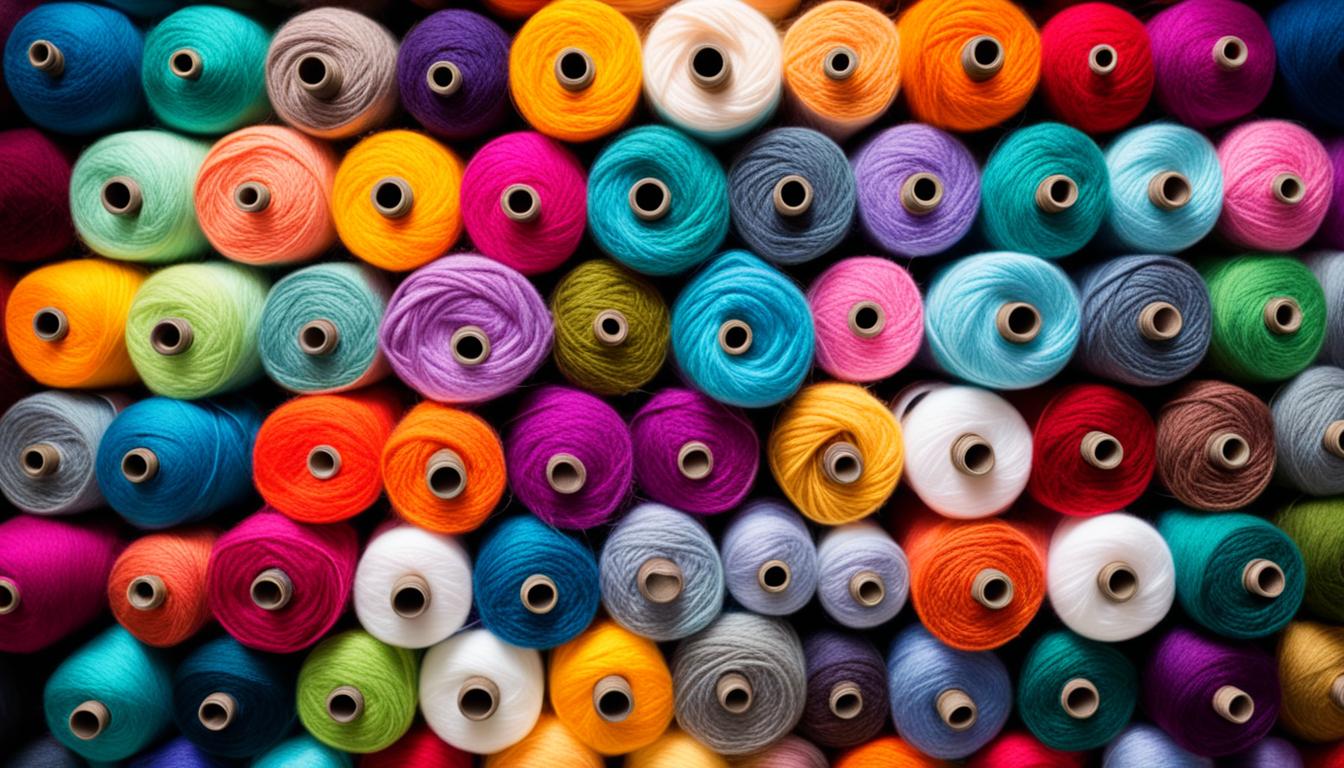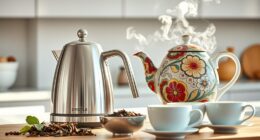When it comes to crafting, durability is a key consideration. You want your creations to withstand the test of time, retaining their beauty and functionality. But have you ever wondered just how strong bamboo yarn really is? Is it as durable as other natural yarns, or does it fall short?
Join us as we delve into the world of bamboo yarn strength and explore its incredible durability. Prepare to be amazed by the benefits of this versatile material and uncover the truth behind its reputation. Get ready to challenge your beliefs and discover why bamboo yarn may just be the game-changer you’ve been waiting for.
Key Takeaways:
- 1. Bamboo yarn is known for its exceptional strength, surpassing other natural yarns.
- 2. Its durability minimizes wearing and fraying, ensuring long-lasting garments.
- 3. Bamboo yarn’s hollowness allows for high absorbency and better dye retention.
- 4. This environmentally friendly option has natural antibacterial properties, preventing unwanted odors.
- 5. Bamboo yarn’s softness and texture provide a luxurious feel and easy stain release.
What Makes Bamboo Yarn Strong?
Bamboo yarn is renowned for its exceptional strength and durability. This can be attributed to the unique properties of bamboo fibers, which possess impressive mechanical characteristics and make them comparable to natural glass fibers.
Bamboo fibers have a tensile strength ranging from 1.43-1.69 GPa and a tensile modulus of 32-34.6 GPa, indicating remarkable strength and resilience. These mechanical properties allow bamboo yarn to withstand tension and pressure, making it an excellent choice for projects that require robust materials.
The twisting bamboo fiber (TBF) reinforced epoxy circumferential composite is particularly noteworthy. It exhibits the highest glass transition temperature among bamboo fiber composites, reaching an impressive 165.89 °C. This indicates its superior plasticizing properties and elasticity, enhancing its overall performance and durability.
However, it is worth noting that bamboo fiber composites typically have lower density and mechanical properties compared to glass fiber composites. This is due to the hollowness of bamboo fibers, which can affect their performance. In composites, the hollow fibers may be pulled out and torn, resulting in lower mechanical performance.
To overcome this limitation and further enhance the comprehensive properties of bamboo fiber composites, researchers are exploring methods to improve the surface and internal structures of bamboo fiber. By refining these structures, the overall performance and strength of bamboo yarn can be further enhanced.
Comparison of Mechanical Properties
| Bamboo Fiber Composites | Glass Fiber Composites | |
|---|---|---|
| Tensile Strength | 1.43-1.69 GPa | N/A |
| Tensile Modulus | 32-34.6 GPa | N/A |
| Density | Lower than glass fiber composites | N/A |
Bamboo fiber composites prepared by filament winding have shown promising potential for developing stable and high-performance materials. These advancements in bamboo yarn technology contribute to its reputation as one of the best yarns for strength.
With its exceptional strength and mechanical properties, bamboo yarn opens up a world of possibilities for various applications across industries such as construction, automotive, and packaging. The resilience and durability of bamboo yarn ensure long-lasting and sustainable products, making it a preferred choice for conscious crafters and consumers alike.
Bamboo Yarn Options for Crochet
Bamboo yarn has become a beloved choice among crochet enthusiasts for its luxurious feel, eco-friendly qualities, and versatility. Whether you’re making garments, accessories, or home decor items, there are plenty of bamboo yarn options that offer both durability and style.
LB Collection Cotton Bamboo Yarn
The LB Collection Cotton Bamboo yarn is a blend of cotton and bamboo viscose. This unique combination creates a yarn that is known for its softness, sheen, drape, and comfort. It’s perfect for creating lightweight and breathable crochet projects.
Lion Brand Truboo Yarn
The Lion Brand Truboo yarn is made from 100% bamboo viscose. This yarn is prized for its lightweight feel, sheen, and drape. It’s an excellent option for crochet projects that require a touch of elegance and resilience.
Go Handmade Tencel Bamboo Fine Yarn
The Go Handmade Tencel Bamboo Fine yarn is a blend of Tencel and bamboo fibers. This combination creates a soft, silky, and eco-friendly yarn option. It’s ideal for crochet projects that require a luxurious touch and sustainable materials.
Universal Yarn Bamboo Pop
The Universal Yarn Bamboo Pop is a blend of bamboo and cotton fibers. This yarn is known for its softness, breathability, and vibrant colors. It’s a great choice for crochet projects that require both durability and a pop of color.
Hobbii Rainbow Bamboo Yarn
The Hobbii Rainbow Bamboo yarn is known for its vibrant colors, soft texture, and light feel. If you’re looking to add a playful and colorful element to your crochet projects, this yarn is a fantastic option.
These bamboo yarn options provide durability and resilience, making them great choices for long-lasting and eco-friendly creations. Whether you’re an experienced crocheter or just starting out, bamboo yarn is sure to elevate your crochet projects to the next level.
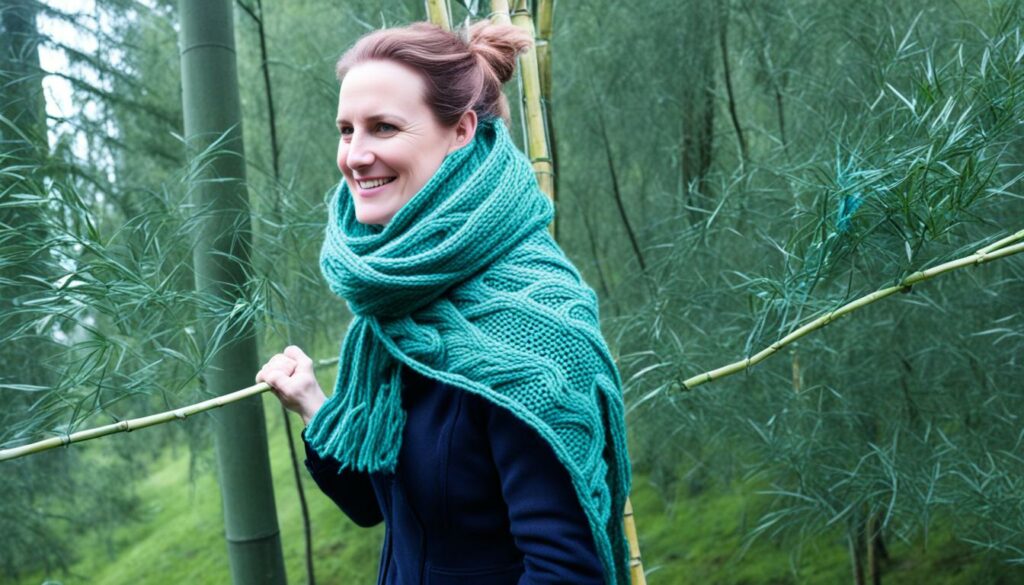
Benefits of Bamboo Yarn Strength
Bamboo yarn offers excellent durability and longevity, making it a top choice for sustainable and long-lasting textiles. Its natural textile durability ensures that garments maintain their shape and quality over time, reducing the risk of wearing and fraying. This makes bamboo yarn the best yarn for strength when it comes to creating resilient and enduring fabric.
One of the unique characteristics of bamboo yarn is its high level of absorbency. It has the ability to hold dyes and pigments more effectively and permanently compared to other yarns. This results in vibrant and long-lasting colors in fabric creations.
The softness and texture of bamboo yarn provide a luxurious feel, making it a delight to work with. The yarn’s elasticity allows for flexibility and resilience, making it suitable for various projects. Whether you’re crocheting garments, accessories, or home decor items, bamboo yarn ensures a comfortable and durable end product.
In addition to its strength and luxurious texture, bamboo yarn brings natural antibacterial properties to the table. This prevents the build-up of odors and maintains freshness in textile products. This natural feature enhances the overall performance and longevity of bamboo yarn.
Furthermore, bamboo fibers have a unique natural texture that is gentle on the skin. Compared to cotton, bamboo yarn releases dirt and stains more easily, simplifying the cleaning process. This ease of maintenance ensures that bamboo yarn creations retain their quality and appearance over time.
Lastly, the biodegradability of bamboo yarn makes it an eco-friendly choice. It decomposes in soil within a short time, ensuring a sustainable end-of-life cycle for textile products.
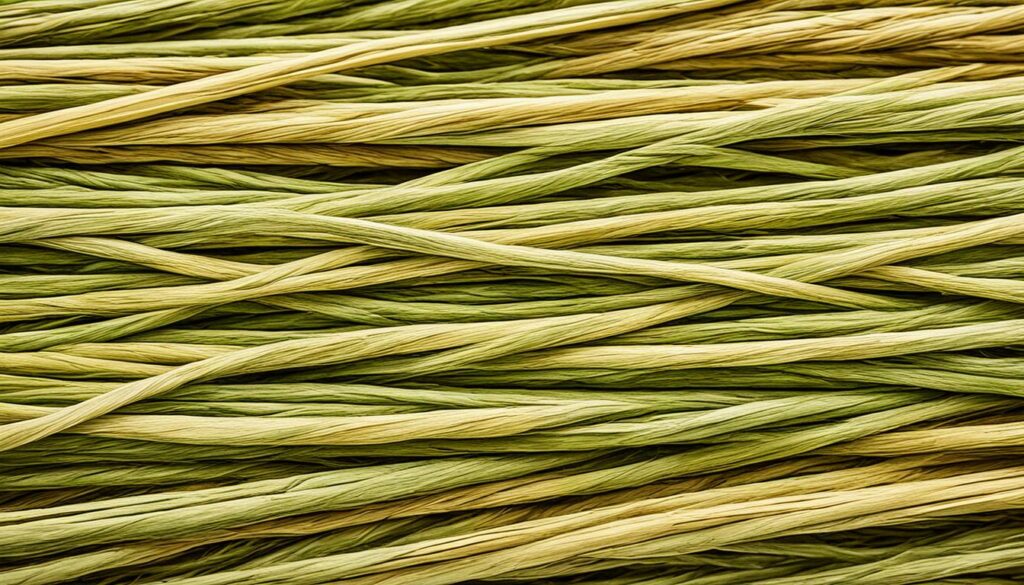
| Benefits of Bamboo Yarn Strength |
|---|
| Durability and longevity |
| High absorbency for vibrant colors |
| Softness and luxurious texture |
| Natural antibacterial properties |
| Gentle on the skin and easy to clean |
| Biodegradable and eco-friendly |
Bamboo Yarn Composites and Performance
Bamboo fiber composites have been extensively studied to explore their structure and mechanical properties. These composites, prepared through filament winding, have shown promise in various applications across industries such as automotive, electrical, decoration, and packaging materials. Let’s delve deeper into the performance of bamboo yarn composites and their mechanical properties.
Comparing Bamboo Fiber Composites
The performance of bamboo fiber composites has been evaluated by comparing them to jute fiber and glass fiber composites as control samples. This comparison provides insight into the unique characteristics of bamboo fibers and their potential in composite materials.
Mechanical Properties
It has been observed that bamboo fiber composites exhibit lower density and mechanical properties compared to jute and glass fiber composites. This can be attributed to the preserved inner tissue structure of bamboo fibers. However, within the realm of bamboo fiber composites, the twisting bamboo fiber (TBF) composites have shown the highest glass transition temperature and the best plasticizing properties. Notably, the TBF circumferential composite has demonstrated better elasticity and a higher storage modulus.
Ongoing Research and Improvement
To further enhance the comprehensive properties of bamboo fiber composites, extensive research is being conducted on the surface and internal structures of bamboo fibers. The goal is to develop improved processing techniques that optimize the performance of these composites. By refining the treatment of bamboo fibers, it is anticipated that the mechanical properties and overall performance of bamboo fiber composites will be enhanced and meet the requirements of various industries.
Now, let’s visualize the comparison of mechanical properties between bamboo fiber, jute fiber, and glass fiber composites in the table below:
| Material | Density (g/cm³) | Tensile Strength (MPa) | Elongation at Break (%) |
|---|---|---|---|
| Bamboo Fiber Composites | 0.5 | 130-160 | 2.5-3.5 |
| Jute Fiber Composites | 0.7 | 200-240 | 1.5-2.5 |
| Glass Fiber Composites | 1.5 | 600-700 | 1.0-1.5 |
As seen in the table, bamboo fiber composites exhibit lower density and mechanical properties compared to both jute fiber and glass fiber composites. However, the unique properties of bamboo fibers, combined with ongoing research and improvement efforts, make bamboo fiber composites a promising material for various applications.
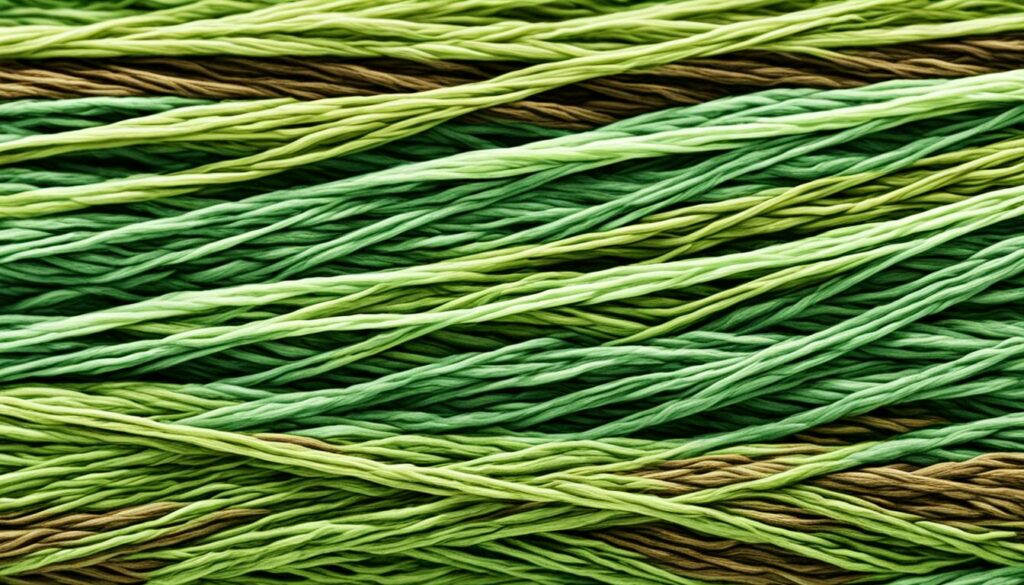
Next, we will explore the wide range of applications that benefit from the strength and durability of bamboo yarn.
Applications of Bamboo Yarn Strength
Bamboo yarn’s strength and durability make it a versatile choice for various applications in the textile industry. Whether you’re creating garments, accessories, home decor items, or even activewear, bamboo yarn offers exceptional performance and longevity.
One of the key benefits of bamboo yarn is its breathability and moisture-wicking properties. This makes it an ideal choice for warm weather clothing, as it helps to keep you cool and comfortable. Unlike synthetic materials, bamboo yarn allows air to circulate and effectively manages moisture, ensuring you stay dry and fresh throughout the day.
Another advantage of bamboo yarn is its softness and comfort, making it particularly popular for sensitive skin and baby garments. The fibers are gentle and smooth against the skin, providing a soothing and luxurious feel.
When it comes to durability, bamboo yarn truly shines. Its inherent strength allows products made from bamboo yarn to withstand regular wear and washing without losing their shape or quality. This means your creations will maintain their beauty and functionality for a long time, reducing the need for frequent replacements.
Not only is bamboo yarn a practical choice, but it’s also eco-friendly. As a sustainable material, bamboo is known for its fast-growing nature and minimal impact on the environment. By opting for bamboo yarn, you’re making a conscious choice to support a greener planet.
Overall, whether you’re a passionate crafter or a responsible consumer, bamboo yarn’s strength, durability, and eco-friendliness make it an excellent option for your textile projects.
Exploring Bamboo Yarn’s Durability
Bamboo yarn has undergone extensive research and study to understand its durability and performance in various applications. Its strength and effectiveness have been measured and compared to other natural fibers. Bamboo yarn has been tested in different scenarios, including clothing and home textiles, to assess its performance. This examination ensures long-lasting and vibrant colors in fabrics as bamboo yarn holds dyes and pigments effectively. The moisture-absorbing and ventilating properties of bamboo fibers contribute to the overall durability and comfort of bamboo yarn. Additionally, bamboo yarn possesses natural antibacterial properties which prevent the build-up of odors, ensuring freshness. With its softness and texture, bamboo yarn is a desirable option for creating comfortable and durable fabrics.
| Bamboo Yarn Performance | Strength in Fabrics |
|---|---|
| Bamboo yarn exhibits excellent tensile strength, making it highly durable in various applications. | Bamboo yarn provides fabrics with enhanced strength, reducing the risk of tearing or wearing over time. |
| Bamboo yarn’s ability to hold dyes and pigments ensures long-lasting and vibrant colors in fabrics. | The moisture-absorbing and ventilating properties of bamboo fibers contribute to the overall durability and comfort of bamboo yarn in fabrics. |
| Bamboo yarn’s natural antibacterial properties prevent the build-up of odors, ensuring freshness in fabrics. | The softness and texture of bamboo yarn make fabrics not only durable but also comfortable to wear. |
If you’re looking for a yarn that combines strength and durability with comfort and performance, bamboo yarn is an excellent choice. Its inherent properties make it suitable for a wide range of applications, from clothing to home textiles. Whether you’re creating garments, accessories, or home decor items, bamboo yarn is sure to deliver the desired durability and strength, ensuring that your creations withstand the test of time.
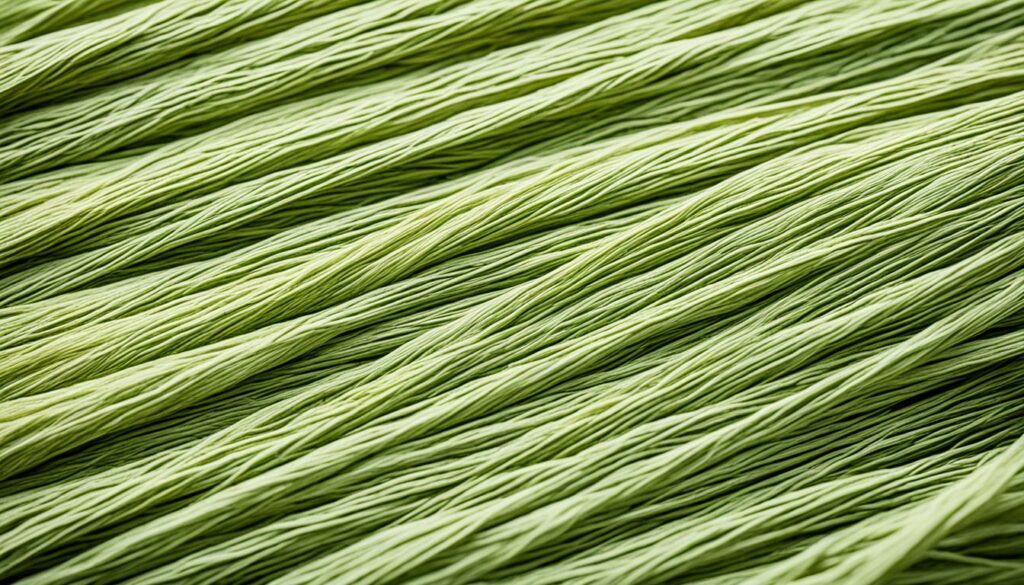
Enhancing Bamboo Yarn’s Performance
Ongoing research is focused on improving bamboo yarn properties and increasing durability in textiles. To achieve this, scientists are studying the surface and internal structures of bamboo fiber, exploring techniques such as decreasing the twisting bamboo fiber (TBF) diameter and increasing the specific surface area of TBF. These innovations aim to enhance the comprehensive properties of bamboo fiber composites by improving the joint surface between fibers and resin.
Through advanced manufacturing processes like filament winding, experts are striving to develop stable and high-performance bamboo fiber composites. The goal is to overcome the hygroscopicity of bamboo fiber and enhance its application performance in various markets.
The innovative approaches being explored in bamboo yarn processing and manufacturing techniques are expected to contribute significantly to the continued growth of bamboo yarn’s durability and its popularity in the textile industry.
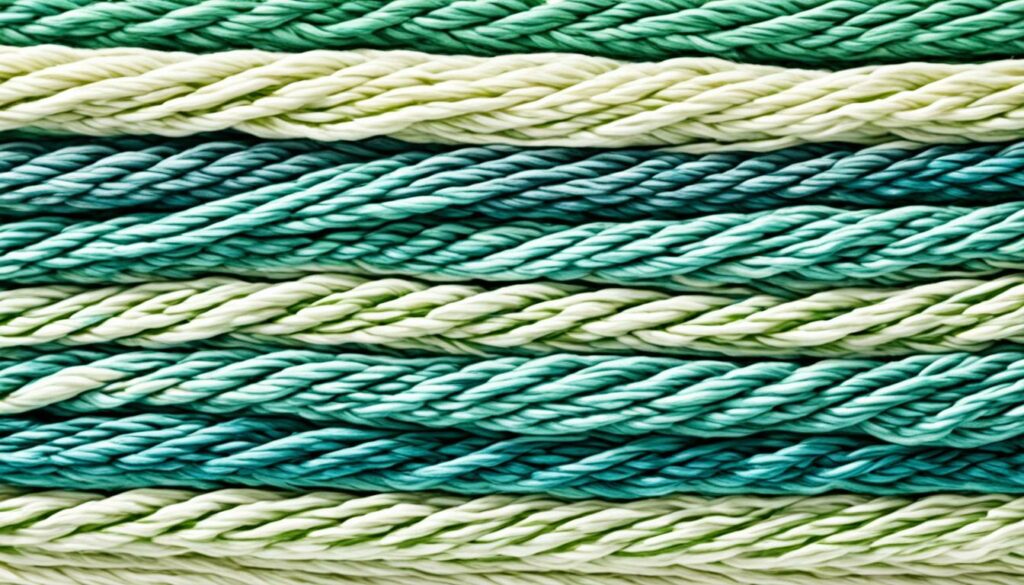
Innovations in bamboo yarn processing and manufacturing techniques will contribute to the continued growth of bamboo yarn’s durability.
The Future of Bamboo Yarn
The future of bamboo yarn holds great promise, with ongoing research and development in the field. Researchers are dedicated to enhancing the performance and durability of bamboo fiber by improving its surface and internal structures. These improvements will contribute to the overall strength and resilience of bamboo yarn, making it even more attractive for textile applications.
Continued advancements in manufacturing techniques, such as filament winding, also play a crucial role in the future of bamboo yarn. These techniques enable the production of high-quality and stable bamboo fiber composites, further enhancing the textile strength and durability of bamboo yarn.
The demand for sustainable and eco-friendly textiles is on the rise, and bamboo yarn is perfectly positioned to meet these needs. Its natural properties, including its strength, softness, and moisture-wicking abilities, make it a versatile choice for a wide range of applications.
Collaborations between researchers, textile manufacturers, and designers will drive the innovation and commercialization of bamboo yarn products. These collaborations will ensure that bamboo yarn continues to evolve and meet the ever-growing demands for durable, eco-friendly textiles in the future.
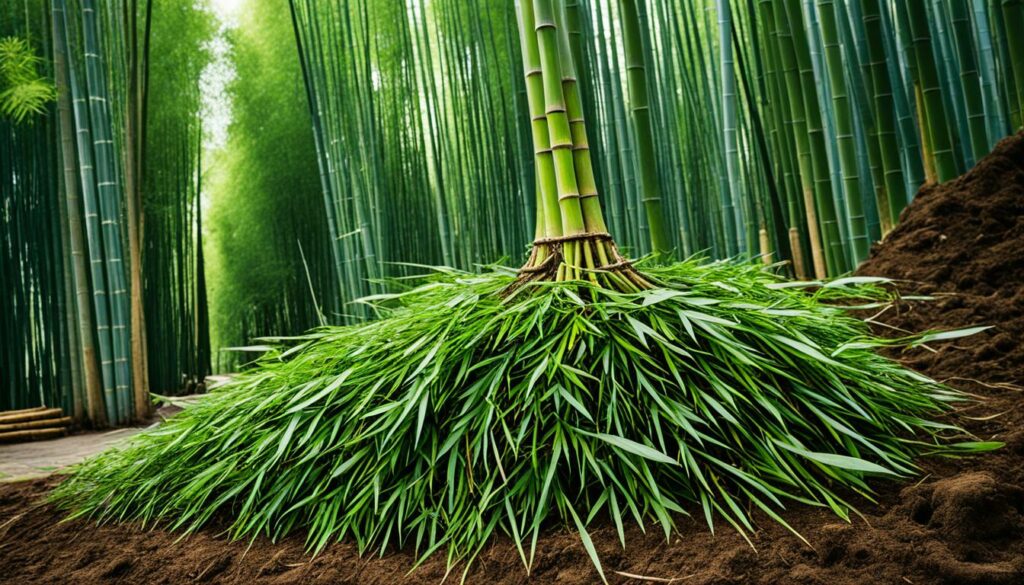
Note: The image above highlights the importance of enhancing textile strength in bamboo yarn.
Conclusion
In summary, bamboo yarn emerges as a remarkable choice for textiles, offering impressive durability and sustainability. Its unique properties, including strength, softness, and moisture-wicking abilities, make it an ideal option for various applications. Ongoing research and development aim to enhance bamboo yarn’s performance and overcome its limitations. Innovations in manufacturing techniques and surface treatment of bamboo fiber will further contribute to its growth and success in the textile industry. Moreover, with its eco-friendly and biodegradable nature, bamboo yarn is a responsible choice that resonates with conscious crafters and consumers alike.
